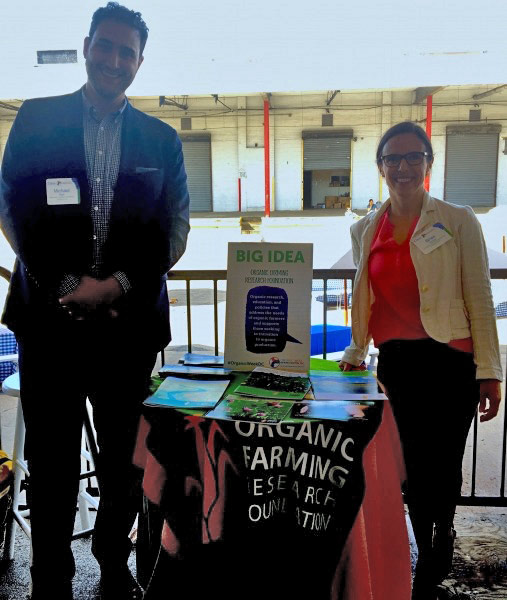
May 28, 2019 – Last week, OFRF and the organic community were in Washington, DC in full force advocating on behalf of the organic sector. Organic Week provides a great opportunity to bring the needs of organic farmers and ranchers to Congress and USDA, discuss issues, showcase outstanding work, and thank our organic champions.
The Organic Trade Association (OTA) named Congressman Dan Newhouse (R-WA) and Congresswoman Chellie Pingree (D-ME) the 2019 Organic Champions. Working in a strong bipartisan fashion, Newhouse and Pingree introduced and advanced the Organic Agriculture Research Act of 2018, which led to permanent baseline funding for OREI in the 2018 Farm Bill. This historic investment in organic agriculture research more than doubled the current funding for the Organic Research and Extension Initiative.
Even with significant wins for organic agriculture, there is still much work to be done to ensure USDA properly implements the law and enacts regulations that continue to support the $52B organic sector in the U.S.
The annual appropriations process is part of the ongoing work. Last week, OFRF spoke with members of the House Agriculture Appropriations Subcommittee as they were preparing to take action on the Fiscal Year 2020 Agriculture Appropriations Bill. The bill seeks to increase funding to $18M for the National Organic Program, which is charged with developing and enforcing the USDA organic standards. This increased capacity will help ensure the continued integrity of the USDA organic seal.
The appropriations bill also seeks to address a regulatory issue that has been impacting organic dairy producers, allowing some operations to transition cows rapidly into organic production. The bill seeks to close the loophole by directing USDA to engage in rulemaking and issue a final regulation for how dairy cows transition to organic production within 180 days.
The appropriations bill will also increase the funding of the cutting-edge Organic Transitions Program (ORG) to $8M, including $45M for the Sustainable Agriculture Research and Education (SARE) program. Both of these programs provide research, education, and outreach on organic and sustainable practices that help farmers be more sustainable and resilient.
Finally, the appropriations bill also includes language that would block the administration from moving two key research agencies outside of Washington, DC. Moving the National Institute of Food and Agriculture (NIFA) and relocating and reorganizing the Economic Research Service (ERS), would undermine the overall integrity of agriculture research, impact the administration of key research programs that farmers around the country rely on, and further politicize agriculture research. Already, OFRF has noticed the impacts these relocation efforts have had on the research and administration of programs that support organic agriculture around the country.
While this is just the first step in the Fiscal Year 2020 appropriations process, it is a step in the right direction. OFRF would like to thank the 2019 Organic Champions, Congressman Dan Newhouse (R-WA) and Congresswoman Chellie Pingree (D-ME), as well as Chairman Sandford Bishop (D-GA) and Ranking Member Jeff Fortenberry (R-NE) of the House Appropriations Committee, Subcommittee on Agriculture, Rural Development, Food and Drug Administration, and Related Agencies.


